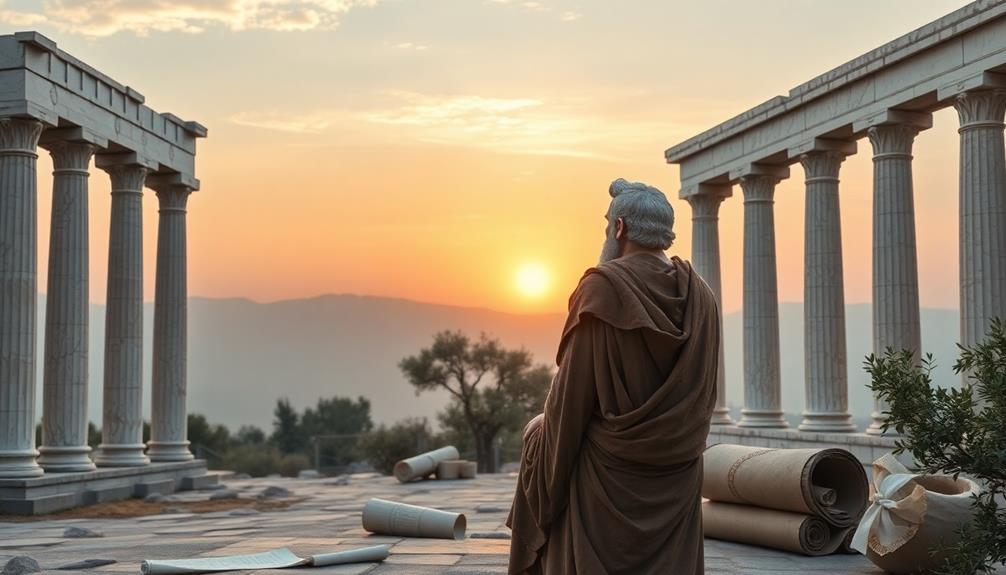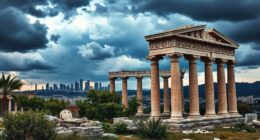In Ancient Greece, skepticism emerged as a significant philosophical movement focusing on inquiry and the suspension of judgment. You'll find figures like Pyrrho, who advocated for the suspension of beliefs to achieve tranquility, and Sextus Empiricus, who emphasized doubt and systematic questioning. These thinkers challenged rigid frameworks of knowledge, promoting relative truth and subjective perception. Schools of thought like Academic Skepticism and Pyrrhonism developed critical approaches to beliefs and knowledge. Their influence laid the groundwork for modern skepticism and shaped today's discourse on truth. Keep exploring to uncover how these ancient ideas continue to resonate in contemporary philosophy.
Key Takeaways
- Ancient skepticism prioritizes inquiry and the suspension of judgment to achieve tranquility and peace of mind.
- Key figures like Pyrrho and Sextus Empiricus shaped skepticism by emphasizing doubt, inquiry, and the relativity of truth.
- Academic Skepticism, led by Arcesilaus, questioned the certainty of knowledge, while Pyrrhonism advocated for complete suspension of judgment.
- Socrates' method of questioning and self-examination laid the groundwork for critical investigations of belief in ancient philosophy.
- The legacy of ancient skepticism influences modern thought, promoting critical thinking, scientific inquiry, and healthy skepticism towards established beliefs.
Definition and Core Concepts
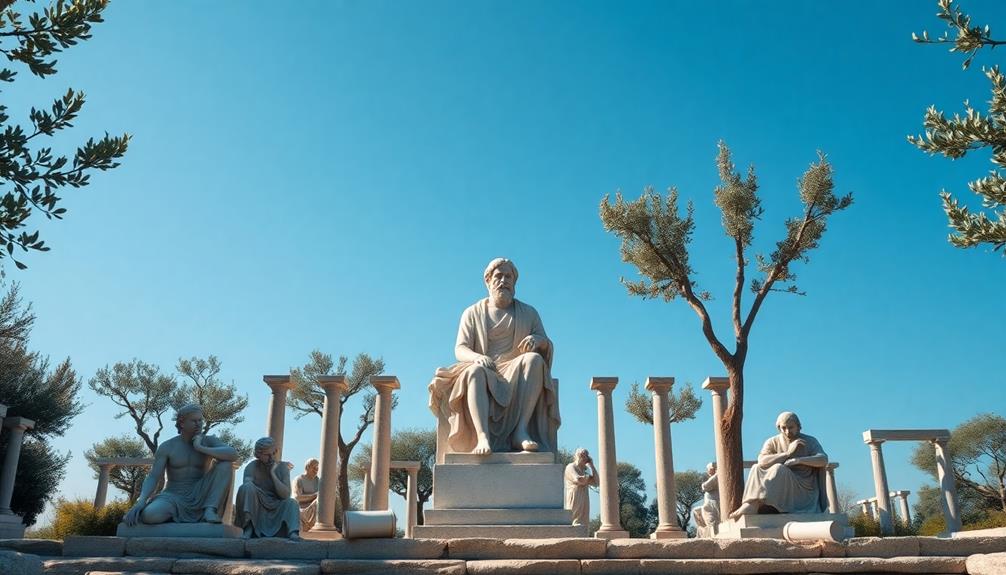
Ancient skepticism, rooted in the Greek term "skepsis," denotes an inquiry-driven philosophy rather than a simple rejection of knowledge. Central to this philosophy is the concept of suspension of judgment, or epoché, which encourages you to refrain from making definitive conclusions about beliefs and knowledge claims. By adopting this approach, you can achieve a sense of peace of mind, as it contrasts with modern interpretations of doubt that often lead to anxiety.
In ancient skepticism, particularly within the framework of Pyrrhonian skepticism, you'll find a keen focus on the nature of belief (doxa) and the criterion of truth. Skeptics asserted that truth is relative; perceptions are subjective, and absolute knowledge remains unattainable. This critical examination of all beliefs challenges dogmatic views upheld by other philosophical schools of the time.
Engaging with ancient skepticism allows you to appreciate the intricate distinction between appearances and reality. By questioning the validity of your assumptions, you cultivate an environment that fosters deeper understanding and reduces the burden of certainty.
Ultimately, this philosophical stance invites you to embrace the journey of inquiry rather than cling to rigid frameworks of knowledge.
Historical Context and Key Figures
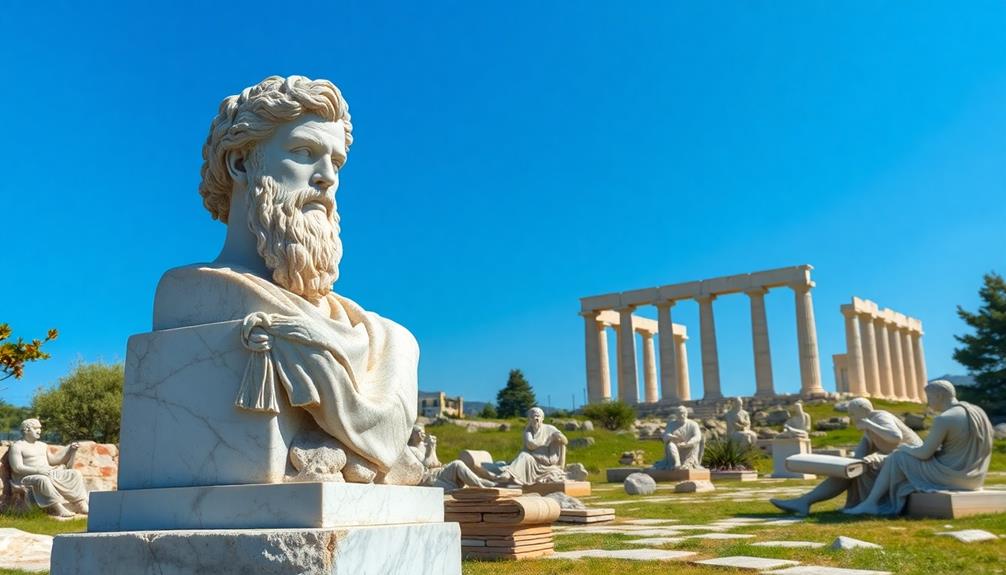
During the Hellenistic period, skepticism emerged as a powerful philosophical force, challenging established beliefs and dogmas. This ancient movement, rooted in Greek philosophy, sought to question the validity of knowledge claims and the certainty of truth. Key figures like Pyrrho advocated suspending judgment to attain tranquility, laying foundational ideas for future skeptics.
Sextus Empiricus played a significant role in systematizing these thoughts, documenting skeptical arguments that would influence generations. In the domain of Academic skeptics, Arcesilaus led the charge by critiquing the Stoics' unwavering belief in certain knowledge. His approach emphasized the importance of questioning what we believe to understand.
Following him, Carneades expanded on these ideas, introducing the concept of pithanon, which evaluated beliefs based on plausibility rather than absolute certainty. Meanwhile, Aenesidemus revived radical skepticism, presenting ten modes of skepticism to further challenge dogmatic assertions.
His work paved the way for later Pyrrhonian thought, emphasizing the need for continual inquiry. Together, these figures shaped the trajectory of skepticism in Hellenistic philosophy, profoundly influencing how knowledge and belief were understood in the ancient world and beyond.
Belief and Judgment Criteria

Skepticism's challenge to dogmatic beliefs naturally leads to a focus on how individuals form judgments and beliefs. At the heart of this examination is the Greek term "doxa," which signifies both belief and opinion, revealing the intricate relationship between appearances and the nature of judgment in ancient skepticism.
Skeptics propose that we can either assent to, reject, or suspend judgment about our impressions. The latter, known as epoch, is essential to their practice.
Consider these criteria for evaluating beliefs:
- Assent: Agreeing with an impression without questioning its validity.
- Rejection: Dismissing an impression as false or misleading.
- Suspension of Judgment: Withholding belief and remaining open to various interpretations.
- Practical Action: Making decisions based on plausible appearances, rather than firm beliefs, as suggested by Arcesilaus.
Carneades further emphasizes the provisional nature of knowledge with "to pithanon," allowing for flexibility in how you evaluate your beliefs.
While critics warn that skepticism might lead to cognitive paralysis, skeptics argue that you can still act effectively based on appearances without clinging to rigid beliefs.
Philosophical Investigations
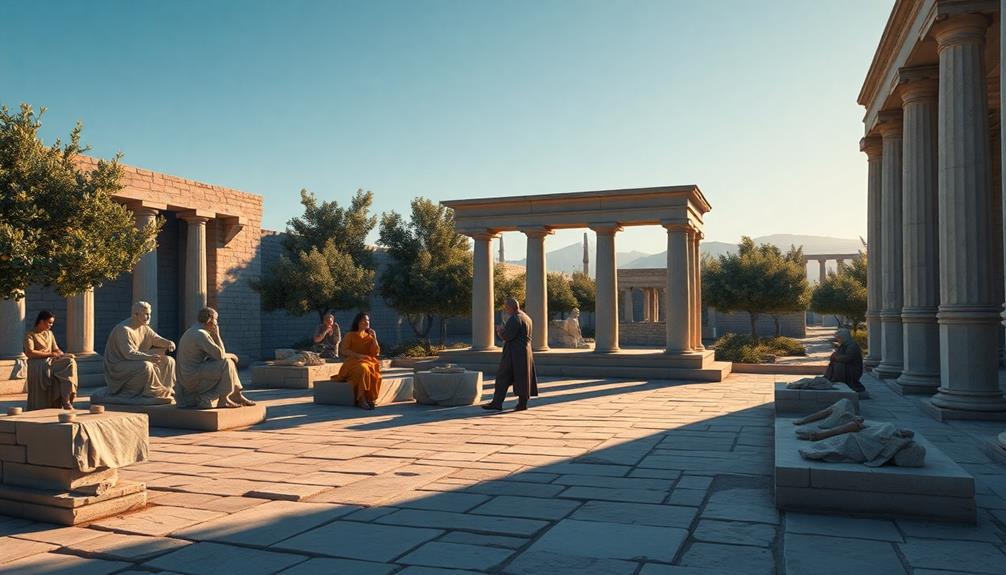
Philosophical investigations in ancient Greece revolve around the critical examination of beliefs and knowledge claims. You'll find that skepticism plays a central role in this inquiry, urging you to question what you think you know. Key figures like Socrates championed self-awareness, encouraging you to scrutinize your beliefs to avoid leading a misguided life.
In dialogues such as Plato's "Theaetetus" and "Phaedo," you see how challenging the distinction between knowledge and belief enhances your understanding of reality's complexities. Aristotle emphasized formulating clear questions, reinforcing the importance of critical thinking in traversing complex concepts.
This method of inquiry aligns with the tenets of Pyrrhonism, founded by Pyrrho of Elis, who believed that achieving inner tranquility (ataraxia) comes from suspending judgment. By doing so, you can manage life's uncertainties without being disturbed by conflicting beliefs.
Sextus Empiricus further documented these ideas, promoting a practical approach to philosophical inquiry—living according to appearances while resisting firm conclusions. This skeptical stance encourages you to embrace uncertainty, fostering a deeper engagement with knowledge and beliefs.
Through these philosophical investigations, you cultivate a more profound understanding of your worldview.
Challenges and Objections
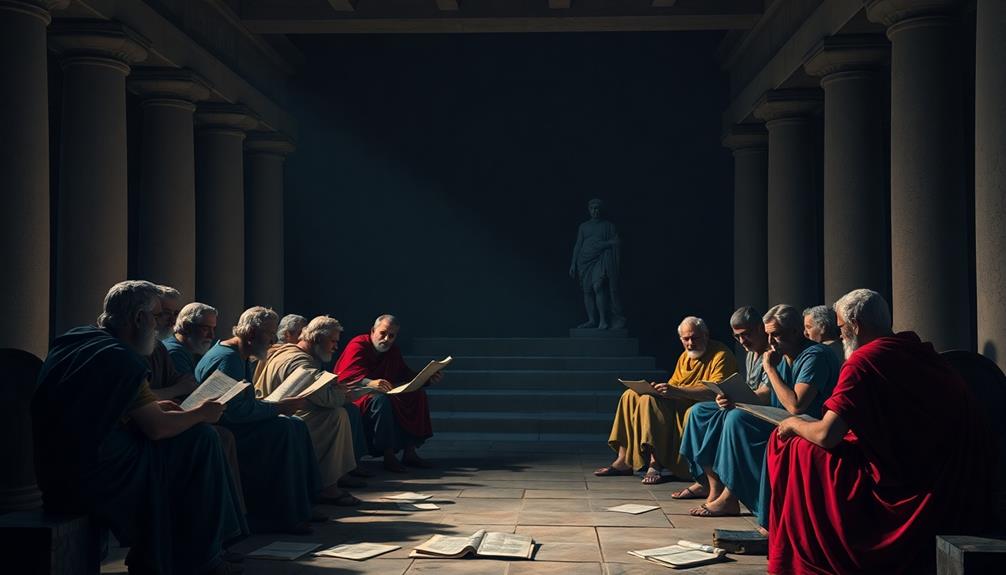
The philosophical inquiries you've explored reveal not only the depth of skepticism but also the challenges it faces. As you examine the arguments, you'll find that skeptics grapple with several significant objections that question the viability of their stance.
- The Apraxia Charge argues that skepticism relies on some form of belief to guide actions, even if it's based on appearances.
- Critics contend that skepticism can lead to cognitive paralysis, making it tough to act or make decisions when judgment is suspended.
- Hume challenges skeptics by asserting that natural beliefs are essential, suggesting that humans can't fully embrace skepticism without contradicting their reliance on certain knowledge.
- The claim of self-refutation emerges when skeptics assert that knowledge is impossible, as this statement itself implies a form of knowledge about that impossibility.
These skeptical arguments raise important questions about how ancient skeptics navigated their philosophy while still engaging in everyday actions and discourse.
Ultimately, the tension between skepticism and the necessity of beliefs creates a complex landscape that challenges both thought and action.
Legacy and Influence
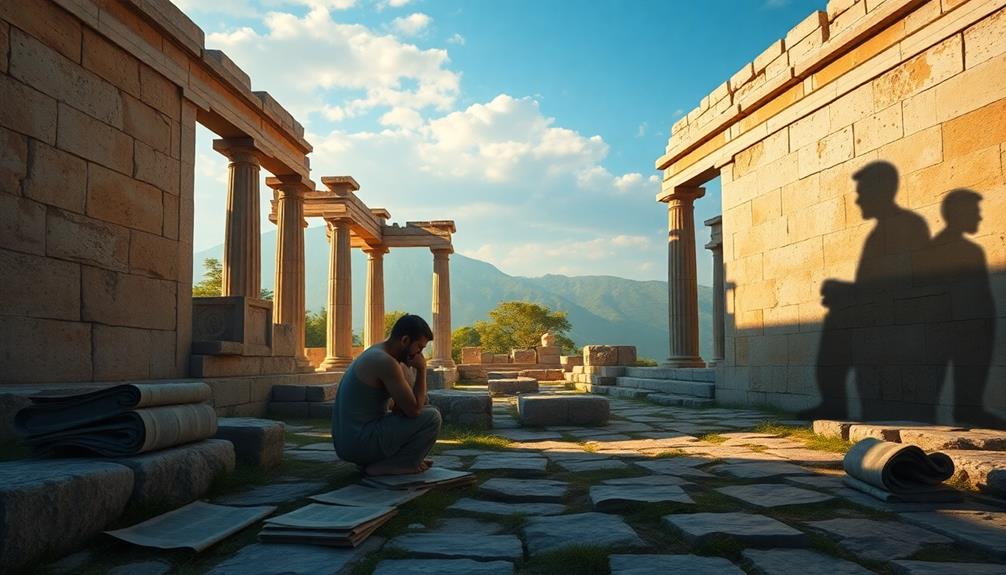
Throughout history, ancient skepticism has profoundly shaped modern philosophical thought by encouraging a critical approach to knowledge. By challenging dogmatic beliefs, figures like Pyrrho, Arcesilaus, and Carneades laid the groundwork for contemporary epistemology. Their emphasis on questioning knowledge claims and the relativity of perception has influenced forms of skepticism that permeate Western philosophy today.
The concept of ataraxia, or inner tranquility, rooted in ancient skepticism, continues to resonate in discussions about achieving peace of mind through doubt and inquiry. This idea highlights how skepticism isn't just about doubt but also about finding a balance in one's beliefs.
Moreover, ancient skepticism's critique of absolute truths has sparked enduring debates surrounding relativism and subjective experiences, particularly in ethics and epistemology. This critical lens prompts you to examine how knowledge is acquired, shaping scientific methodologies and philosophical frameworks throughout history.
In essence, ancient skepticism remains an essential part of your intellectual heritage, urging you to question, reflect, and seek deeper understanding in a world often dominated by unquestioned assertions. Its legacy continues to inspire a thoughtful approach to knowledge and belief.
Frequently Asked Questions
What Is Skepticism in Ancient Greece?
Skepticism in ancient Greece encourages you to doubt assertions and investigate beliefs. It promotes withholding judgment to find tranquility, emphasizing that truth is relative and advocating for action based on plausible appearances rather than absolute certainties.
Who Is the Founder of Greek Skepticism?
You might find that Pyrrho of Elis is considered the founder of Greek skepticism. He taught that suspending judgment leads to tranquility, emphasizing that perceptions are subjective and nothing is inherently good or bad.
What Is the Philosophical View of Skepticism?
Skepticism's philosophical view emphasizes questioning knowledge claims and recognizing the limits of certainty. You're encouraged to challenge assumptions, seek inner peace through suspended judgment, and understand that truth can be subjective and relative.
What Is the Greek School of Skepticism?
"Curiosity killed the cat, but satisfaction brought it back." The Greek school of skepticism challenges certainties, urging you to question knowledge claims. It emphasizes inquiry, suspending judgment to find inner peace through understanding perceptions' relativity.
Conclusion
In exploring the philosophical roots of skepticism, you uncover a landscape rich with questioning and doubt, much like a fog-covered mountain. Just as climbers must navigate through the mist to find their footing, you too can learn to embrace uncertainty in your journey for truth. Skepticism teaches you that questioning isn't weakness; it's the first step toward deeper understanding. So, remember, it's okay to pause and reflect before forging ahead on your intellectual climb.

